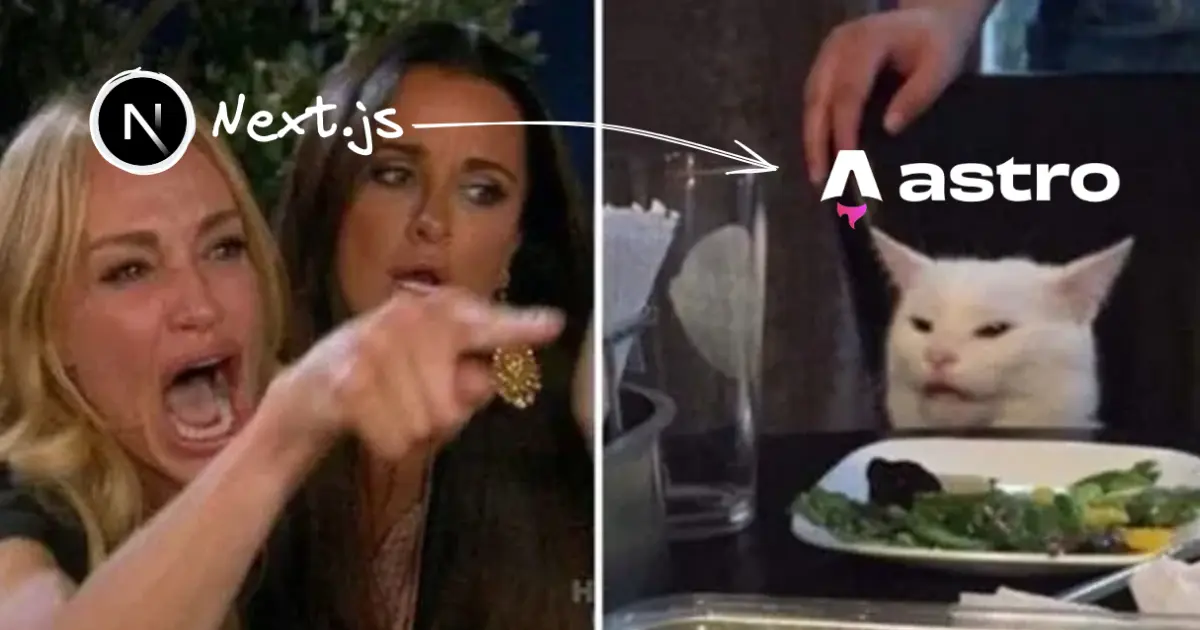I rewrote my blog in Astro

Hey there 👋! I’ve just migrated my blog from Next.js to Astro. In this post, I’ll dive into why I made the switch and highlight all the cool, out-of-the-box features Astro brings to the table! 😎
Why I Left Next.js😔
I was using Next.js 14 with Contentlayer, a solid setup for content-heavy sites.
Highlights
- Managing content was straightforward. Just set up a folder, configure your schema, and you’re ready to create
.mdor.mdxfiles. - Types for the schema were generated automatically.
- MDX support was a bonus.
Cons
- Extending the config with plugins like syntax-highlighting was tedious.
- Contentlayer isn’t actively maintained.
If your still planning stick with Next.js, I recommend content-collections. I found it throught this blog post very simple to integrate comes with MDX & Typescript support, and may be a good alternative to Contentlayer.
Getting to Know Astro🧐
In my case i know about astro earlier, it’s popular for content-driven sites. Started checking few open-source repos using Astro, clonned there blog website starter template. Started replicating my Next.js app on Astro
Features
- MDX can be used with a plugin
- Syntax highlighting is built-in with ShikiJS.
- Content schema can be defined using Zod.
- Devtools are optimized and suggest helpful improvements. 🔥🔥🔥
- Easy for anyone with basic HTML and CSS knowledge to pick up.
- Excellent documentation 📙 and well-crafted starter templates.
Challenges
- Astro isn’t an SPA by default, unlike Next.js, but it can act like one if you use the ViewTransitions component.
- Astro generates everything statically by default, including API routes, which led to some trial and error when creating dynamic APIs.
Migration process
- First step i’ve created astro-app with blog template
npm create astro@latest- Copy pasted the public & directly paste in astron project no changes required there
- I’ve added necessary plugins React Components, TailwindCSS & Vercel for server side processing
// astro.config.mjs file
// @ts-check
import { defineConfig } from "astro/config";
// Here are my plugins specified👇
import mdx from "@astrojs/mdx";
import react from "@astrojs/react";
import sitemap from "@astrojs/sitemap";
import tailwind from "@astrojs/tailwind";
import vercel from "@astrojs/vercel/serverless";
import { transformerNotationHighlight } from "@shikijs/transformers";
// https://astro.build/config
export default defineConfig({
site: "https://blog.pavanbhaskar.com",
// simply add those plugins here👇
integrations: [mdx(), sitemap(), react(), tailwind()],
// syntax highlighting comes by default no extra packages are required!
markdown: {
shikiConfig: {
themes: {
light: "dracula",
dark: "everforest-light",
},
transformers: [transformerNotationHighlight()],
},
},
vite: {
optimizeDeps: {
exclude: ["@resvg/resvg-js"],
},
},
output: "hybrid",
// vercel adpater is to handle dynamic API's or for Server side rendering
adapter: vercel(),
});- I’ve created a schema for content with Zod
- So by default in astro content lives in
src/contentfolder - In
contentfolder i’ve created a blog folder & moved myMDXfiles there! - You can specify your content config in
config.tsinsrc/contentfolder
- So by default in astro content lives in
// config.ts file
import { defineCollection, z } from "astro:content";
const blogConfig = defineCollection({
type: "content",
// Type-check frontmatter using a schema
schema: z.object({
title: z.string(),
summary: z.string(),
// Transform string to Date object
date: z.coerce.date(),
imageURL: z.string(),
tags: z.array(z.string()),
}),
});
// here i've exported blog with blogConfig
// Which means whatever content in src/content/blog folder will use blogConfig schema!
export const collections = { blog: blogConfig };- I’ve created API routes with my page-view count & rate limiting API’s logic
- To create a API route which returns JSON you can create
route.json.tsfile - so if i hit
localhost:4321/route.jsoni’ll get JSON response
- To create a API route which returns JSON you can create
- Check here for more migration details link
How it improved content creation process
- Astro’s markdown support is fantastic! 🔥
- It’s a well-maintained project with a growing community. 🔥
Now, all that’s left is to keep creating content!
Bonus💫
- Try astro-paper as stater template for you blog—it’s packed with useful features, including OG image generation.
- Check this youtube channel coding in public. Has good tutorials on Astro!
- Even my website is open source check it out repo link
I missed last week’s post because of the migration. Hope you enjoyed this one! ✌️